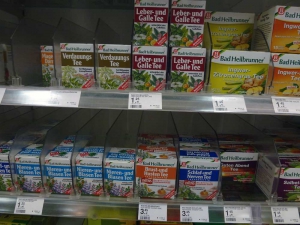It’s been widely reported today that Haribo (which markets a sweet called Goldbär – gold bear) won in a case against Lindt Sprüngli, which has been introducing a gold-foil-wrapped bear for Christmas. The court in Cologne held that people would refer to the Lindt product as ‘gold bear’, thus diluting the mark into which Haribo has pumped huge amounts of money in advertising. (No, commenters, the court did not say that people could not tell the difference between a ‘gummy bear’ and a chocolate bear). Die Welt (German):
Denn die meisten Verbraucher werden laut Gericht den “Lindt Teddy” naheliegenderweise und ungezwungen als “Goldbären” bezeichnen – und eben nicht als Teddy”, “goldene Bärenfigur”, “goldfoliierten Bär” oder als “goldfarbenen Schokoladenteddybär”.
Haribo konnte auf die Umfrage eines unabhängigen Meinungsforschungsinstituts verweisen: 95 Prozent der Verbraucher würden die traditionsreiche Wort-Bildmarke “Goldbär” kennen.
The Local (English):
But the judges said that shoppers were likely to refer to the Lindt product as a “Gold Bear” because of its appearance and thus dilute the Haribo brand.
“Most consumers would not use descriptions such as ‘golden bear figure’, ‘gold foil-wrapped bear’ or ‘gold-coloured chocolate teddy bear’… but rather the closest description, particularly considering how well-known the other brand is: Gold Bear,” it said in a statement.
The decision isn’t final – Lindt will be appealing. It was commented that this particular point of law – whether a word mark can be diluted by the appearance of another mark – has not been decided by the highest courts (höchstrichterlich), or that there has not been a fundamental decision (Grundsatzentscheidung).
Die Welt:
Eine höchstrichterliche Rechtssprechung gebe es zu einer solchen Kollision nämlich noch nicht, erklärte das Kölner Landgericht.
The Local:
“What is special about the case is that there has been no high court ruling on the issue of a collision between a brand name and a three-dimensional product design,” it said.
That is very American. It’s common in the USA to refer to the Supreme Court as the ‘high court’.
I’m not sure if the highest court here would be the Bundesgerichtshof or the Bundespatentgericht. At all events, to call such a decision a ‘landmark decision’ would not be correct. What is meant is a binding decision – not that Germany has an official system of precedent, but in practice it seems like that. A landmark decision is one that makes the news in a big way.
LATER NOTE: Guardian article – with mug shots of the two bears.












